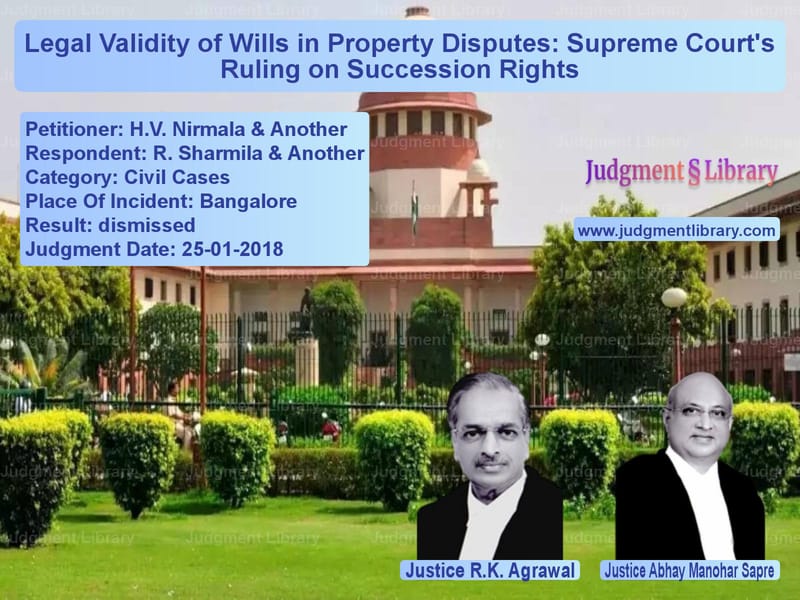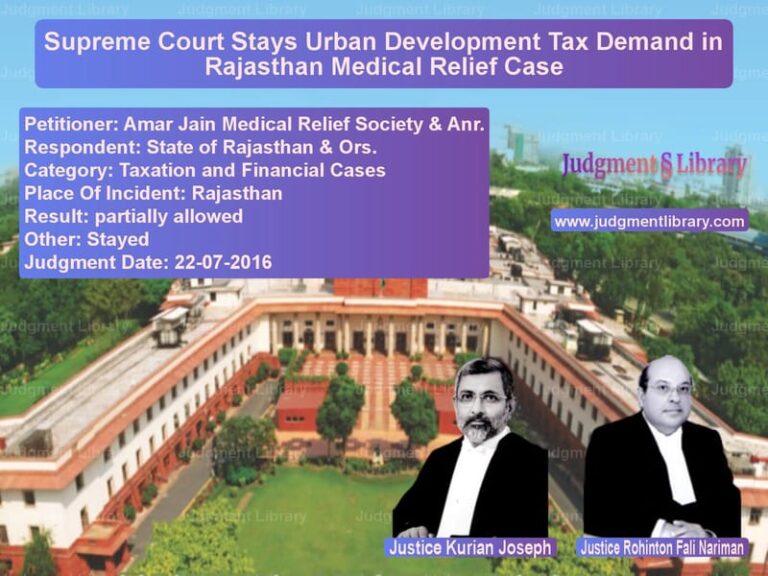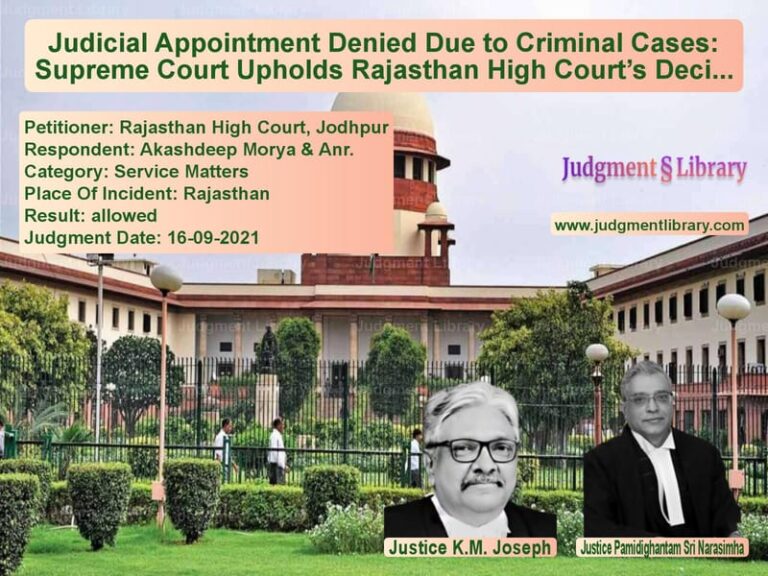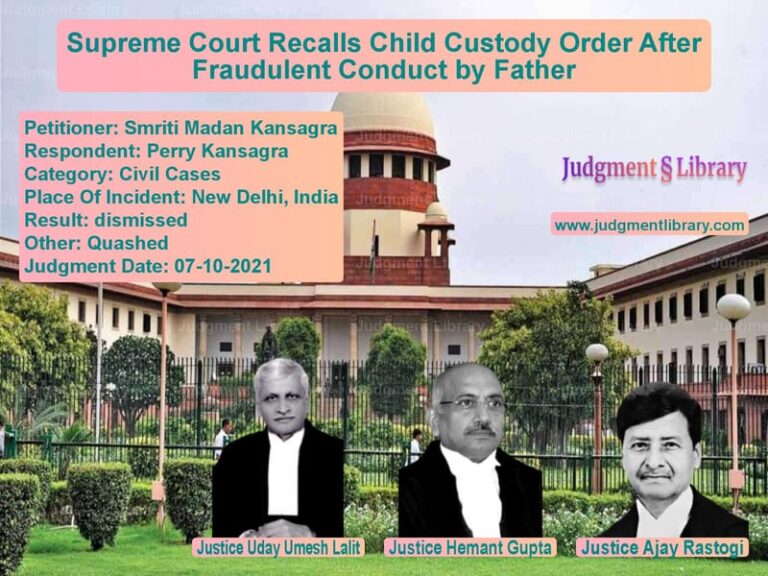Legal Validity of Wills in Property Disputes: Supreme Court’s Ruling on Succession Rights
The Supreme Court of India, in the case of H.V. Nirmala & Another vs. R. Sharmila & Another, examined a contentious family dispute regarding inheritance rights and the validity of two conflicting wills. The case revolved around the succession rights over immovable properties that originally belonged to the deceased patriarch, Ramaiah. The judgment provides significant clarity on the admissibility of wills, the necessity of compliance with legal formalities, and the impact of registered versus unregistered wills in property succession matters.
Background of the Case
The dispute centered around properties that once belonged to Ramaiah, who had two wives—Smt. Hemavathi (first wife) and Smt. Nirmala (second wife). From his first marriage, he had a daughter, R. Sharmila (plaintiff), and a son, Umesh (defendant no. 1). From his second marriage, he had a son, Rakesh Babu (defendant no. 3). Ramaiah passed away on 26.11.1995.
The conflict arose over two competing wills:
- A will dated 12.03.1980, allegedly executed by Ramaiah, bequeathing his properties to Sharmila and Umesh (children from the first wife).
- A later will dated 20.05.1995, favoring the children from the second wife.
The High Court of Karnataka ruled in favor of the first will (12.03.1980), but the decision was challenged before the Supreme Court by Nirmala and Rakesh Babu.
Key Legal Issues
- Was the will dated 12.03.1980 legally valid and proved in accordance with the Indian Evidence Act, 1872?
- Could the later will dated 20.05.1995 override the first will?
- What is the impact of a registered will versus an unregistered will?
- Was the compromise decree obtained in an earlier suit binding on all family members?
Arguments by the Petitioners (Nirmala & Rakesh Babu)
The petitioners, who were challenging the validity of the will dated 12.03.1980, argued:
- The will dated 12.03.1980 was not proved in accordance with law.
- The High Court failed to consider the later will dated 20.05.1995, which was more recent and should prevail.
- The properties had already been partitioned through a compromise decree dated 25.01.1997, and the plaintiff (Sharmila) could not claim ownership.
Arguments by the Respondent (R. Sharmila)
The respondent (plaintiff) countered these claims by arguing:
- The will dated 12.03.1980 was legally executed and registered, making it a valid legal document.
- The later will did not mention or revoke the first will, indicating its dubious nature.
- The plaintiff was not a party to the compromise decree of 1997, making it non-binding on her rights.
- Since the father, Ramaiah, executed the will in favor of his minor children out of love and affection, it was a natural disposition of property.
Supreme Court’s Observations
The Supreme Court scrutinized the evidence and the legal principles surrounding the proof of wills under Section 68 of the Indian Evidence Act. The key observations were:
- “The will dated 12.03.1980 is a registered will, and the absence of revocation in the later will makes it the valid legal document.”
- “When a father bequeaths his property to his minor children, it is a natural act, and there is no reason to suspect foul play.”
- “The original will was in the possession of defendant no. 1 (Umesh), and the plaintiff produced a certified copy obtained from the Registrar’s office, which was legally admissible.”
- “Since the later will dated 20.05.1995 did not revoke the earlier will, it cannot override the first will.”
Supreme Court’s Judgment
The Supreme Court upheld the High Court’s ruling, confirming the validity of the will dated 12.03.1980 and dismissing the appeal. The Court stated:
- “The plaintiff has successfully proved the will dated 12.03.1980 in accordance with the law, and there is no reason to hold otherwise.”
- “The decree passed in the compromise suit of 1997 is not binding on the plaintiff as she was not a party to it.”
- “The judgment of the High Court is correct in concluding that the plaintiff is entitled to the properties as per the will of 1980.”
Legal Precedents Considered
While delivering the judgment, the Supreme Court referred to important legal principles on proving wills and succession:
- H. Venkatachala Iyengar vs. B.N. Thimmajamma (1959) AIR 443: The Court reiterated that proving a will requires adherence to Section 68 of the Evidence Act.
- Guro (Smt.) vs. Atma Singh (1992) AIR SC 2188: A later will must specifically revoke an earlier will to be considered legally superior.
- Janki Narayan Bhoir vs. Narayan Namdeo Kadam (2003) 2 SCC 91: A registered will carries stronger evidentiary value than an unregistered will.
Implications of the Judgment
This ruling has far-reaching implications for succession disputes and will execution in India:
- Registered wills are given priority unless a subsequent will explicitly revokes them.
- Compromise decrees cannot affect the rights of individuals who were not parties to the settlement.
- The proof of a will must conform to legal requirements under the Evidence Act.
- Courts will carefully scrutinize claims of forgery and fabrication in property disputes.
Conclusion
The Supreme Court’s ruling in H.V. Nirmala & Another vs. R. Sharmila & Another reinforces key principles of inheritance law, ensuring that registered wills are given due legal recognition unless specifically revoked. The case highlights the importance of adhering to procedural safeguards in proving wills and serves as an essential precedent in property inheritance disputes. The judgment provides much-needed clarity on the proof of testamentary documents and the legal validity of property claims arising from family disputes.
Don’t miss out on the full details! Download the complete judgment in PDF format below and gain valuable insights instantly!
Download Judgment: H.V. Nirmala & Anoth vs R. Sharmila & Anothe Supreme Court of India Judgment Dated 25-01-2018.pdf
Direct Downlaod Judgment: Direct downlaod this Judgment
See all petitions in Property Disputes
See all petitions in Succession and Wills
See all petitions in Judgment by R K Agrawal
See all petitions in Judgment by Abhay Manohar Sapre
See all petitions in dismissed
See all petitions in supreme court of India judgments January 2018
See all petitions in 2018 judgments
See all posts in Civil Cases Category
See all allowed petitions in Civil Cases Category
See all Dismissed petitions in Civil Cases Category
See all partially allowed petitions in Civil Cases Category







